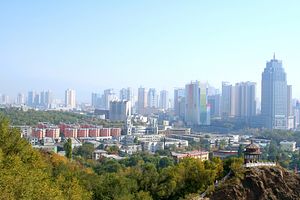China is in the midst of an unprecedented series of terrorist attacks attributed to Uyghur separatists. From the October 2013 car crash in Tiananmen Square to the March stabbings in Kunming and the attack last week at the Urumqi South Railway Station, there’s growing evidence that militant groups may be shifting their focus from attacks on military and paramilitary outposts to purely civilian locations. Facing this challenge, Chinese President Xi Jinping has called for China to step up its fight against terrorism. “Decisive actions must be taken to resolutely suppress the terrorists’ rampant momentum,” Xi declared.
Doubtless China will seek to step up its security measures, both in Xinjiang proper and at large civilian gathering public areas with large numbers of civilians. Train stations have proved an especially attractive target for terrorists — just this morning, six were reported wounded in yet another stabbing attack at a railway station, this time in Guangzhou.
But, as Xinhua noted in a commentary, security measures will only go so far. The million dollar question, as the commentary noted, is this: “How should we address the social problems that have left China’s far western region of Xinjiang vulnerable to terror threats and ethnic tension?” And the answer, according to Xinhua, is actually quite simple: improve the quality of life “through balanced development.”
This was also Xi Jinping’s focus during his recent tour of Xinjiang. In an analysis of Xi’s Xinjiang visit, Xinhua predicted that Beijing’s “renewed Xinjiang policy” would have three elements: “Fighting terrorism with an iron hand, implementing development to benefit the common people, and strengthening military presence in the region.” Increased security would take place alongside revving up regional development. In particular, Xi emphasized that investment in the region should have an immediate impact on local people’s lives by providing employment and higher incomes.
As Xinhua pointed out, this is not a new strategy. In 2010, China’s central government unveiled a major economic blueprint for Xinjiang, aimed to raise the region’s per capita GDP to national average levels by 2015. “The region has recorded double-digit economic growth in recent years,” the commentary noted proudly. And yet, on the whole, large companies and entrepreneurs (often from outside Xinjiang) have been the major beneficiaries of Xinjiang’s development. As a result, Xinhua pointed to a wealth gap, especially “in mixed ethnic areas” as a major source of ethnics tension.
In other words, China’s grand economic plans for Xinjiang may have actually exacerbated issues due to imbalanced growth. This problem was also noted in a 2012 Council on Foreign Relations report, “Uighurs and China’s Xinjiang Region.” Along with economic development, the report said, came increasing number of migrant workers, especially those from the majority Han ethnic group. This in itself has caused tensions, as some Uyghurs feel they are being marginalized in their own home. Even worse, economic inequality continues to be broadly divided along ethnic lines, as Han residents tend to be wealthier than their Uyghur counterparts.
Beijing still believes that economic development can be a panacea for the ethnic tensions in Xinjiang, but there’s a growing recognition that the current model is not working. Op-eds in Xinhua and China Daily both noted that the government should do more to combat “the underlying economic causes … of terrorism, separatism and religious extremism.” Specifically, Beijing must focus on making sure the economic benefits of local development are actually enjoyed by Uyghurs. The government has faced similar problems in Tibet.
As of yet, there are no answers for how, exactly, China plans to tweak its policies to ensure more balanced development in Xinjiang. But articles in state-owned media like Xinhua and China Daily show Beijing is aware of the problems caused by uneven development that marginalize ethnic minorities.

































